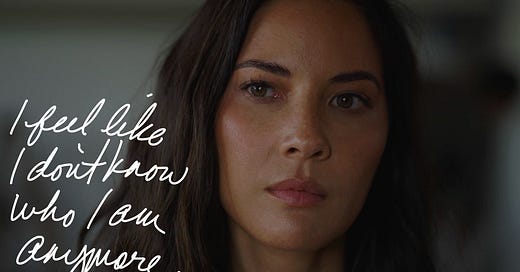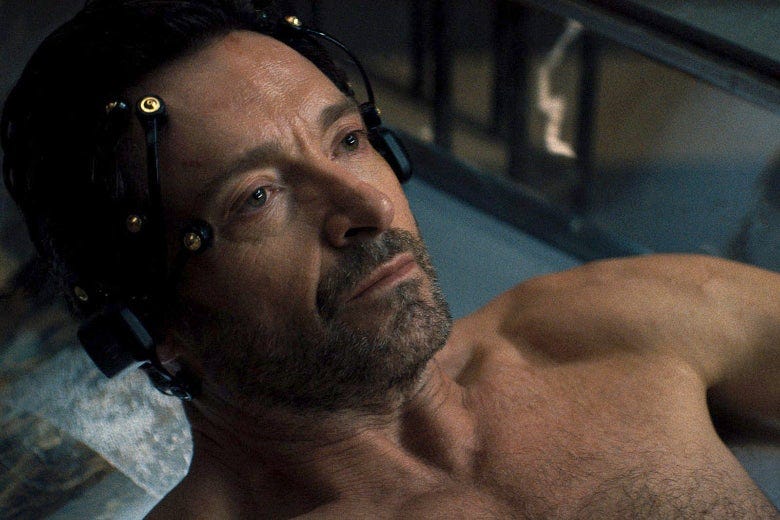It doesn’t take much to get a woman labeled “unruly.” Whether it’s sticking up for herself or being too timid or simply demanding to be treated equally, we live in a society that’s very eager to pathologize women for not being happy with the status quo. It’s a hard road to walk, but we all walk it together, and thankfully that makes the experience just a tiny bit more bearable.
This week we’re talking about two movies written and directed by women in their feature film debuts. First, Cate on Justine Bateman’s Violet and the infernal prison of your own mind. Then, Zosha on Lisa Joy’s ambitious but hollow Reminiscence.
Cate on Violet
Violet is a hard movie to describe. Simply enough, it’s the story of a mid-level executive at a small Hollywood production company and her ongoing battle with personal demons. But taken from a distance, Justine Bateman’s directorial debut is a deeply felt examination of mental health and self-doubt, wrapped up in a formally inventive presentation.
Olivia Munn leads the relatively small cast as the aforementioned executive Violet. She’s hypercompetent and excels in her job, and we quickly learn that she’s the backbone of the small production outfit where she works. But Violet is haunted by a Voice (Justin Theroux) that needles at the back of her mind, telling her that she’s unworthy, unwelcome and undeserving of love. Her junior employees disregard her instructions, her egotistical boss embarasses her in meetings and her estranged brother harangues her for not being more involved with their emotionally abusive family. Each time, she lets them get away with it.
The Voice emerges in moments of interpersonal tension, feeding her anxiety and convincing her that it’s not worth it to stand her ground or stick up for herself. As he smothers her own objections and feelings, her thoughts bubble up as text on the screen, combatting his heavy control of her mind and giving us a window into her thinking.
As the story unfolds, we learn that in her last relationship, Violet let The Voice convince her to leave the candles burning in her shared apartment, leading to a fire that burned down their home. Ever since, she’s been hyper concerned with never straying outside of the lines, or taking risks. Now, when The Voice emerges, he overtakes her waking conscious mind, leading to a kind of brownout. Each time, the screen warms to an ominous, all-consuming red as he whispers “doesn’t that feel better now?” She’s released from the fear of the moment and transported to the next moment.
The problem of course is that everyone around Violet can tell that she is not ok. When The Voice takes over, she lashes out, instigating fights that she doesn’t stick around long enough to work through. In one pointed moment, she runs into the aforementioned ex with his new baby, and panicking at the encounter, calls the child ugly and runs away. The Voice is meant to be protecting her from strife and conflict, but as the film progresses, Violet realizes that it’s only exacerbating her problems. So, she starts to rebel.
She tells her boss that she’s worth more than the way she’s been treated and quits. She follows up with a job offer that The Voice told her she wasn’t good enough to pursue. She apologizes to her ex. She refuses to go to her mother’s funeral or interact with her abusive family. And best of all, she allows herself to believe that she deserves to be with her friend Red (Luke Bracey), with whom she’s been living. When The Voice lashes out, she challenges him, asking what the worst consequence will be. And when she realizes she’s no longer afraid of risk, she’s free of him forever.
Anyone who’s struggled with anxiety or self doubt will likely see reflections of themselves in Violet. Bateman’s choice to make use of all available sensory outputs deftly mimics the all-encompassing heat that can come when a panic attack lingers. It’s an inventive directorial decision that brings viewers directly into Violet’s headspace. Olivia Munn gives a career-best performance conveying reams of emotion through her facial expression alone. Her actual spoken dialogue is few and far between, but her own internal thoughts come through clear as day, matching what viewers can see on the screen. It’s the perfect matchup of formal innovation with skillful staging and acting.
What stuck out so much about this film was how internal it is. 80% of the action happens within the bounds of Violet’s own head, and yet the movie never feels stilted or slow. Bateman carries Munn through the scenes with ease, and Violet feels like a person heavily burdened by her own fear. She both resents The Voice and relies on him, convinced he will keep her safe from the terror he is stoking within her. It’s only when she’s brave enough to trust her own voice and her own instincts that she can be free of him. It’s a nice, tidy little lesson about the self-doubt we all struggle with — a metaphor made literal.
Zosha on Reminiscence
Reminiscence perplexes me, and I don’t think it’s for the reason the movie hopes. It is, on paper, something close to what we could call “My Shit™️”: In a dystopic-adjacent future, when climate change has sunk large swaths of Miami and other cities around the world, people turn to memory machines, where they relive their favorite moments from life. Bannister (Hugh Jackman) runs a joint where people pay for the privilege, and he is their dream guide, leading them through the path as he watches along. When a mysterious woman name Mae (Rebecca Ferguson) uses his services, they fall in love — at least, until she vanishes, leaving a lot more questions in her wake.
To get this out of the way, I know that sounds like it teeters on the edge of drivel, a movie that could go either way. That is, often times, the sci-fi sweet spot. Watching the trailer 800 times in theaters did nothing to elucidate which way it might go. But still I appreciated the visual of it, the lush colors and bold images cued to crescendoing music; I held out hope that while these concepts — of nostalgia as crutch and drug alike, of neo noir sci fi, of Hugh Jackman as an action lead not named Wolverine — could still bear new fruit. Alas.
Reminiscence is shallow by design. Not every sci-fi has to move the needle on science fiction as a whole, but if it’s going to take the well-worn territory of the past as an opiate people turn to in dire times as a distraction, it should probably break some new ground. Although the movie says outright that nostalgia is a siren’s call, it falls prey to that very thing, trying to recreate noir tropes through a sci-fi lens with nothing more to say about it. The memory machine takes the place of extended flashbacks or lengthy monologues, but does it actually add anything more to the plot?
These sorts of things could be excused, I suppose, if the dialogue weren’t so intent on bashing you over the head with it. To give you an example of showing and not telling, which the dialogue Reminiscence could’ve used more of, I’ll remind you how the trailers trumpeted that the movie was from “the minds that brought you Westworld [the show].” Smarter minds would’ve heeded that warning; I, as I’ve said, dared to dream, and now come to you singed for it. Reminiscence is full of desperate people saying maudlin things, packing in as much exposition as mechanically as they can.
What I can say is Reminiscence is exactly the kind of middling science fiction that might hit right now. You might miss that Jackman never quite comes across as a lost cause, merely a strong man chasing down a lead for some of the stunning sets he wanders through. Or you might ignore how Thandie Newton’s Watts never feels like a whole character because you’re distracted by how good Ferguson’s costumes look (and get wondering about the mechanics of a dystopic future where her garments could be believed to be found “at a thrift shop”). There is a part of me that never sees time with science fiction as a waste, merely a promise unfulfilled, fallen short. Reminiscence is fine enough for a lazy Saturday movie night with clever housemates, chattering over it. Beyond that, it’s lost in its own sauce.
Assorted Internet Detritus
CATE: Passing and passing, what black women gave to reality television, Kyle Richards’ come up, mothers daughters and abortions, festival season must-sees, finding Marie Calloway, a profession is not a personality, the full timeline of Belinda Blinked, moral panic journalism, Dave Chapelle: comedy relic, on beauty and power, the legacy of the East Compton Clovers, and the staying power of Charlamagne.
ZOSHA: The tabloids is Ben Affleck’s best role. An explainer on Netflix’s top ten, for if you’re wondering how it works. Paris Hilton’s sex tape and what a generation took away from it. Hyperreality and Drive <3. The self help no one needs right now. How Netflix’s queer channel belies some bullshit of corporate authenticity. IATSE is striking and you can too!
If you haven’t heard, our very own Zosha starts soon as the new TV Editor at Polygon!!! Cate is very proud of her and can’t wait to brag on her friend.
Otherwise, everything else remains the same. You know the drill: if you’re just finding this newsletter, do us a favour and subscribe. It feeds our fragile egos. And if you’re already a loyal reader, help us out and tell a friend. Happy movie yelling!
Zosha + Cate <3
twitter:@30FlirtyFilm
instagram:@30FlirtyFilm









